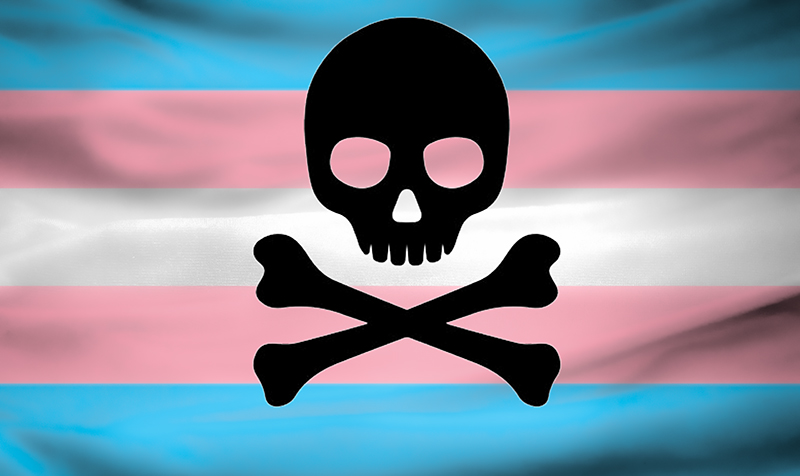UK Trans Swimmer Races Topless to Protest Competing as Male
Anne Isabella Coombes says her topless protest highlights the flaws in Swim England’s transgender athlete ban.

A transgender woman swimmer in the United Kingdom recently competed topless at a Masters event, protesting a policy that requires her to compete based on her assigned sex at birth.
Seeking to highlight flaws in the one-size-fits-all ban on transgender competitors, Anne Isabella Coombes, 67, of Reading, chose to wear a men’s swimsuit while competing — exposing her breasts in the process.
Coombes, a member of the Reading Swimming Club for 30 years, transitioned five years ago, during the COVID-19 pandemic. When public swim meets resumed, she applied to Swim England — the national governing body of aquatic sports — asking to compete as a female, reports the Reading Chronicle.
After submitting personal details and documentation of her transition, including medical interventions, Swim England officials allowed Coombes to compete as a female in a 2023 Masters event.
“Masters swimming is usually very inclusive,” the veteran swimmer said. “They do try and let anyone compete. I came second in that race. The woman who came first was a whole length ahead of me. She broke the European record; she’s an excellent swimmer.”
But after competing in that race, Coombes says Swim England contacted her for a consultation.
By September 2023, the organization adopted new regulations barring transgender and nonbinary competitors assigned male at birth from participating in female-designated events.
Under the policy — adopted to ensure “fairness” for cisgender female swimmers — athletes assigned male at birth, regardless of how they identify, are expected to participate in “open” events.
After being told of the new regulations, Coombes asked what type of swimsuit she was required to wear.
She was told to wear a women’s bathing suit.
“They confirmed that I need to wear a female swimming costume despite having to compete with the men, which ‘outs’ me as a woman who is transgender,” she said of the conversation with Swim England. “I explained to the person on the phone that they are not allowed to do that, and he didn’t have an answer.”
Coombes chose not to compete in any races until this year, when she decided to swim topless at the Cornwall County Masters in protest of the policy’s assumptions about transgender bodies.
“I’m trying to show the world that this policy isn’t thought through, and it’s meant to hit trans people and nobody else,” she said.
She also defended her desire to compete as a woman, arguing: “There are many who say I should only compete against men because I have a man’s advantage, and that just isn’t the case.
“I want to make it clear through this protest that trans people are not a threat when it comes to sport,” she continued. “We aren’t winning everything, and if we started to, then I would be first in line to discuss other options. Right now, it is a non-issue.”
Coombes says Swim England has told her that if she arrives at a competition intending to wear a male swimming costume, she does not need permission from the event referee. Still, a referee may choose to disqualify her, or any other swimmer, for violating Swim England’s guidance that swimwear should be in “good moral taste.”
“Deciding on whether exposing my breasts is in ‘good moral taste’ or whether I need to cover them up so that ‘those involved in competitive swimming are appropriately safeguarded’ is an entirely subjective decision of the referee,” Coombes said. “In other words, I could turn up to the competition and run the risk of not being able to compete in whichever costume I intend to wear.
“No other swimmer has this concern,” she added. “These regulations also mean that Swim England is treating me as a male by default.”
The UK Supreme Court ruled in April that transgender women do not fall under the legal definition of ‘women” in the context of the country’s nondiscrimination laws.
Since then, transgender advocates have held protests across the United Kingdom, including two in Reading. Coombes spoke at one such protest in Truro, urging members of the transgender community to stand up for their rights.
“Most trans people just want to get on with their lives and be treated as the gender they are,” she said. “But unfortunately, given what the Supreme Court has done, we need to stand up and say ‘I’m trans, I exist, and you’re not going to silence me.’ Existence is resistance.”
Support Metro Weekly’s Journalism
These are challenging times for news organizations. And yet it’s crucial we stay active and provide vital resources and information to both our local readers and the world. So won’t you please take a moment and consider supporting Metro Weekly with a membership? For as little as $5 a month, you can help ensure Metro Weekly magazine and MetroWeekly.com remain free, viable resources as we provide the best, most diverse, culturally-resonant LGBTQ coverage in both the D.C. region and around the world. Memberships come with exclusive perks and discounts, your own personal digital delivery of each week’s magazine (and an archive), access to our Member's Lounge when it launches this fall, and exclusive members-only items like Metro Weekly Membership Mugs and Tote Bags! Check out all our membership levels here and please join us today!


























You must be logged in to post a comment.